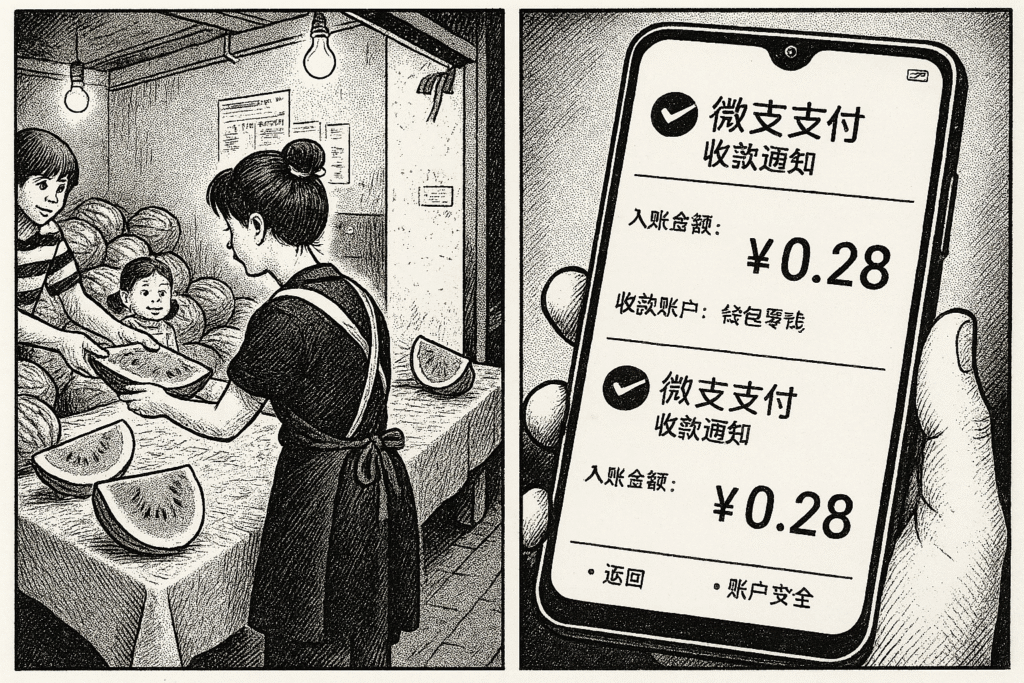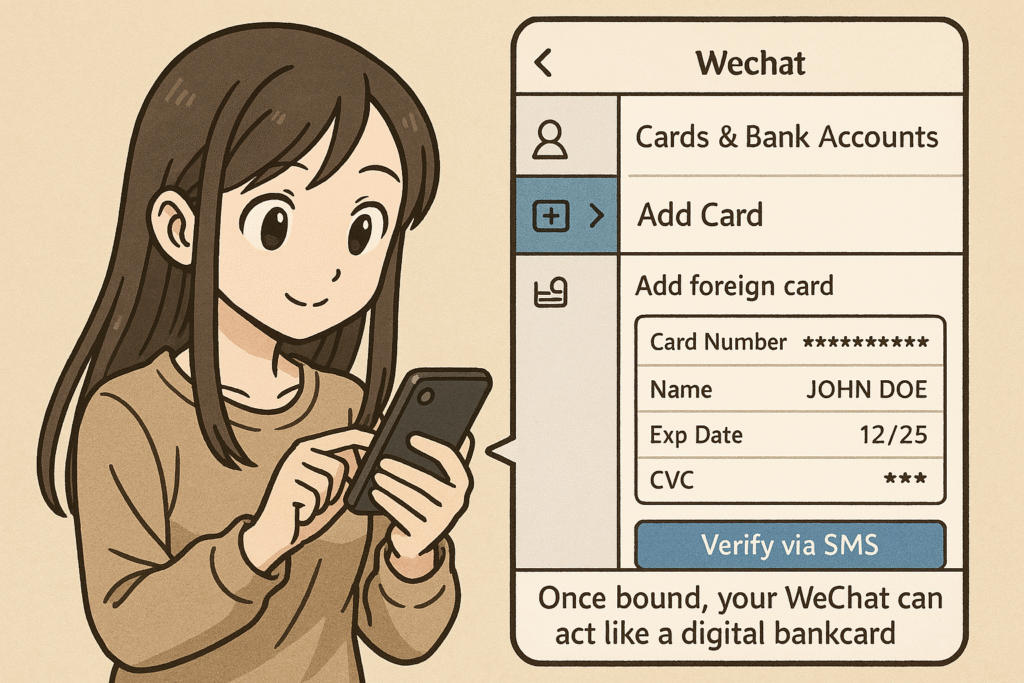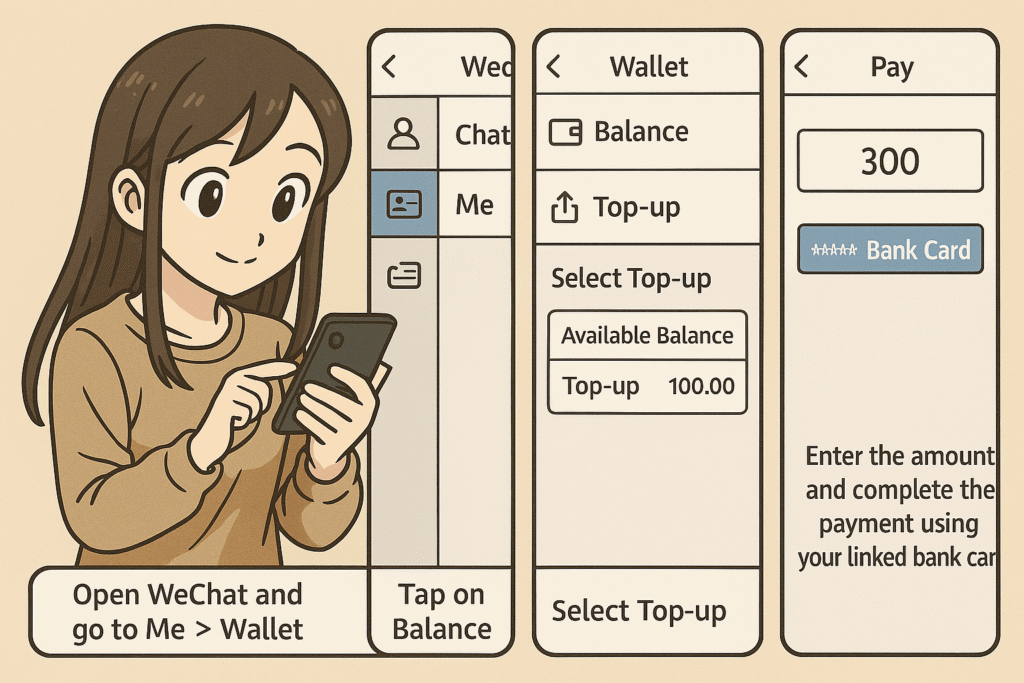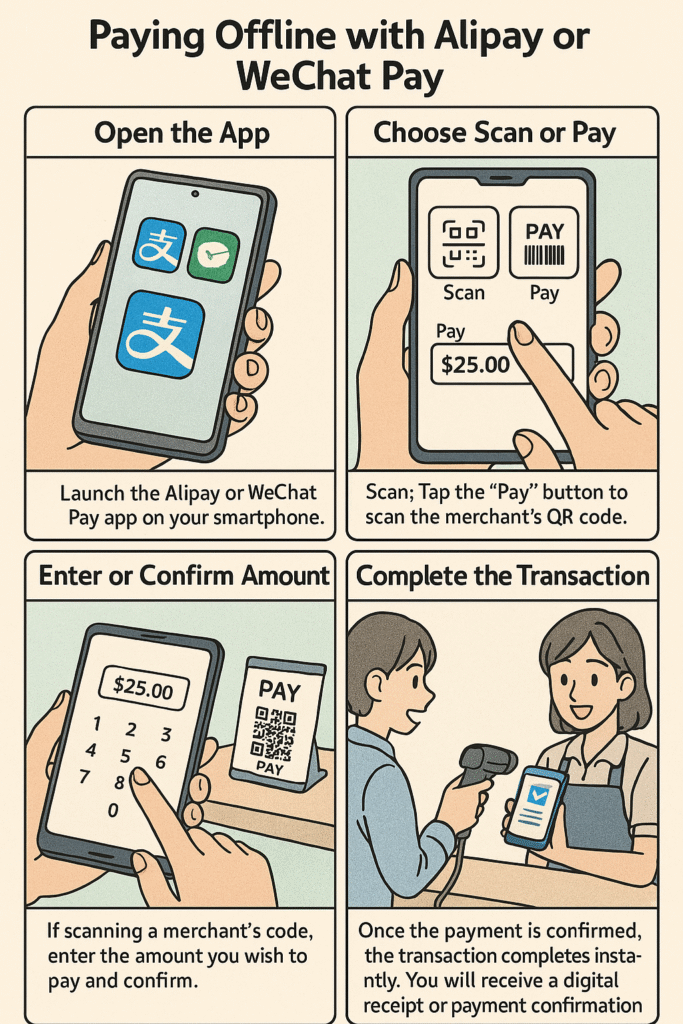In China, the use of mobile payment is virtually universal. Regardless of age—whether young or elderly—people rely on their smartphones to make payments for meals, shopping, transportation, and more, simply by scanning a QR code. According to data, over 85% of the population uses mobile payment services, truly achieving nationwide adoption.
If you’re planning to travel to China, learning how to use mobile payment systems can greatly simplify your trip. With just a smartphone, you can easily handle most transactions—whether dining, shopping, or commuting—without the need to carry cash or physical bank cards.
Why You Should Use Alipay & WeChat Pay
When people talk about “mobile payments” in China, they’re usually referring to Alipay and WeChat Pay. These two apps are used everywhere—whether you’re in a big city like Beijing or a small town in the countryside. Almost every shop, restaurant, convenience store, or even street vendor accepts them.

So once you know how to use either Alipay or WeChat Pay, you don’t have to worry about whether a place accepts your payment—it almost always will.
Requirements for Using Mobile Payments
A valid passport

A valid passport is a prerequisite for using mobile payments, especially when registering for Alipay and WeChat Pay. During the registration process, you will typically be required to provide your passport information for identity verification.
A mobile phone number

In addition, you will need to provide a mobile phone number during registration for account activation and security verification. After submitting your passport information, you may also be required to complete facial recognition or other forms of verification to finish the registration process. If you plan to stay in China for an extended period, it is recommended to get a Chinese mobile number, as this will help avoid unnecessary hassles later.
Chinese bank account or international credit card

Some banks, such as ICBC (Industrial and Commercial Bank of China), Bank of China, and Citibank China, allow foreigners to open a local RMB bank account using only their passport and visa documents. This enables you to fully access all features of Alipay and WeChat Pay, including peer-to-peer transfers, utility payments, and offline purchases.
If you don’t have a local bank account, you can still use a limited version of these payment services: Alipay supports linking foreign credit or debit cards for purchases with international merchants and allows you to top up RMB for basic transactions; WeChat Pay also accepts foreign credit cards and, depending on your country or region, may support top-ups via overseas banking systems.
Step-by-Step Setup Guide
Install the Apps

From the App Store or Google Play, download Alipay, which is available in English and multiple other languages, and WeChat, where the Pay function can be found in the “Me” section.
Activate Alipay
Open the app and go to Me > Bank Cards
Tap “Add Card” and input your foreign card details (card number, expiry, CVV)

Pay a test transaction (e.g., 1 RMB) to confirm card binding
Optional: Complete real-name authentication by scanning your passport, uploading a selfie, and filling in nationality and birthdate
Once authenticated, you can top up using your foreign card and use the balance across China.
Activate WeChat Pay

Open WeChat and go to Me > Wallet
Tap “Cards & Bank Accounts” > “Add Card”
Fill in foreign card info and verify via SMS
Once bound, your WeChat can act like a digital bankcard
How to Add Money (Top-up)

Open WeChat and go to Me > Wallet
Tap on Balance
Select Top-up
Enter the amount and complete the payment using your linked bank card
| Method | Platform | Steps | Notes |
|---|---|---|---|
| Foreign card | Alipay | Wallet > Top-up > Recharge with Bank Card | Varies by card issuer |
| Foreign card | WeChat Pay | Wallet > Balance > Top-up > Link overseas card | FX rates apply |
| Tourists’ account | Alipay | Use “Tour Pass” feature, deposit via supported currencies | 3 percent fee, time-limited |
| Chinese bank card | Both | Instant payments with full feature access | Most reliable option |
Paying in Stores and Transport

Paying Offline with Alipay or WeChat Pay
Open the App
Launch the Alipay or WeChat Pay app on your smartphone.
- Choose Scan or Pay
- Scan: Tap the “Scan” button to scan the merchant’s QR code.
- Pay: Tap the “Pay” button to display your personal payment QR code or barcode.
- Enter or Confirm Amount
- If scanning a merchant’s code, enter the amount you wish to pay and confirm.
- If showing your payment code, the merchant will scan it and the payment amount will appear for your confirmation.
- Complete the Transaction
Once the payment is confirmed, the transaction completes instantly. You will receive a digital receipt or payment confirmation in the app.
Traveler-Specific Tips

- Check with your foreign card issuer for daily limits on digital payments
- Be aware of exchange fees, usually 1 to 3 percent
- Switch app interface to English via Settings
- Carry backup cash or UnionPay card for remote areas
- Use prepaid eSIM or local SIM for stable connectivity
Common Issues and Solutions
- Card not supported: try another card or issuer
- SMS delay: use reliable Chinese SIM or eSIM
- Tour Pass expired: monitor validity and top-up requirements
- Payment blocked: inform your bank in advance about travel
- App login issues: some users may need VPN temporarily during account setup
Frequently Asked Questions
Can I use virtual cards like Revolut?
Yes, some work with Alipay. Not all are accepted. Try and test small amounts.
Is Apple Pay or Google Pay accepted?
Not directly. Most Chinese vendors require local QR code scan systems.
Do I need a Chinese bank account?
Not strictly. Foreign cards and Tour Pass are sufficient for most tourists.
Are there any hidden fees?
Foreign transactions may incur conversion or bank fees. Check with your issuer.
Travel Tips to Maximize Mobile Payment
- Install both apps before your trip
- Get a Chinese phone number or eSIM to ensure verification
- Set spending alerts and monitor in-app reports
- Look out for first-time user bonuses or coupons
- Enable in-app security settings like fingerprint authentication
- Use WeChat mini-programs for food, shopping, or hotel bills
- Avoid relying solely on cash—digital is the default in China
Conclusion
In 2025, traveling in China without Alipay or WeChat Pay is like navigating without a map. From metro rides to dumpling stalls, almost everything runs on QR codes. The good news? Foreigners can now join the cashless revolution with just a passport, a phone, and a few setup steps.
Follow the steps in this guide and you’ll be ready to pay like a local—faster, safer, and smarter.



